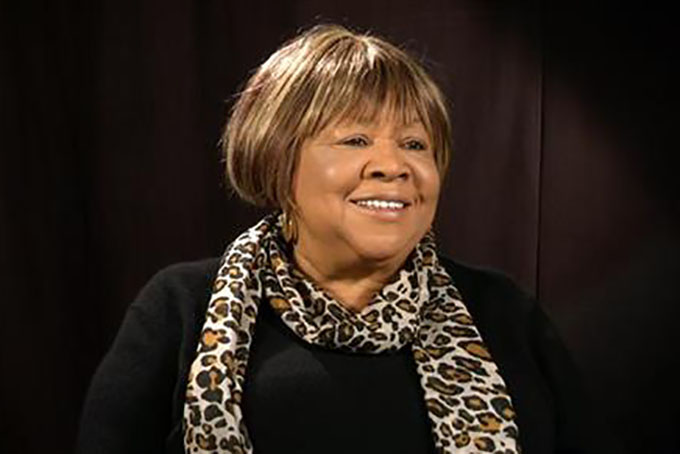
“I don’t feel like it’s time for me to sit in a rocking chair,” Staples said. “I don’t feel like it’s time for me to retire. I feel so frisky … I still have my gift that the Lord gave me and I intend to keep using it.”
Her memory remains sharp, and she can vividly recall the day Pops was excited to hear Mavis, her brother and two sisters sing together in their Chicago home. Pops took a guitar from the closet that he had bought at a pawnshop to accompany them; Mavis didn’t realize that her dad learned how to play while growing up in Mississippi.
The Staple Singers built their career in Black churches in the 1950s. Their freedom songs were part of the soundtrack to the civil rights movement. King liked their song “Why Am I Treated So Bad” and invited them to perform when he had speaking engagements. Pops also noticed young Dylan’s songwriting, and the Staples performed “Blowin’ in the Wind.”Young Mavis and Dylan noticed each other, too. “We may have smooched,” she said with a smile.
The early 1970s represented the act’s commercial peak. Signed to the Stax label, a rhythm section was added and classics like “Respect Yourself” and “I’ll Take You There” were made. To some of the Staples’ gospel fans, the act had embraced the devil’s music. But Mavis recited a verse of “I’ll Take You There” in an interview to illustrate a consistency of message. Pops initially demurred when Curtis Mayfield asked them to record “Do It Again,” saying, “I’m a church man.” Mayfield assured them that “the Lord won’t mind.”
Changing styles and times pushed the Staples to the background. Mavis recorded two solo albums with Prince in the late 1980s, but they were victims of his record company battles at the time and given little attention. One of Mavis’ heartbreaks is that Pops recorded his own album before his death in 2000, but did not live to see it released.
With the help of fellow Chicagoan Jeff Tweedy of Wilco, that music made its way into the world. Tweedy was a benefactor, respecting Mavis’ history and still-formidable skills, and made two discs with her. It brought her music to a new generation. Mavis won Grammy Awards in 2010 and 2016; the Staple Singers never won.
Her record company suggested Staples sing songs written specifically for her by young, rock-oriented musicians for her project “Livin’ on a High Note,” released last month. Staples spoke to each writer and requested upbeat songs.
Staples had never met producer Ward, and was counseled by a friend that he was the quiet type. He was no match for a woman nicknamed “Bubbles.”
“They said, ‘Mavis, you’re going to love him but he’s very shy,'” she said. “I thought, ‘If I could get Prince to talk, I’ll get him to talk.’ So we got along fine.”
Any deterioration that age has visited on her voice seems minor. While the low notes may be easier than the high ones, Staples believes she’s more seasoned and in control of her instrument. She has a band that recalls but doesn’t imitate the sonic blueprint set by Pops, and she still sings with her sister Yvonne.
“I’m proud that I have survived and I have been here for such a long time and people still want to hear what I have to say,” she said.
Put her in front of an audience, and it looks like she never wants to leave.
____
Online:
https://www.mavisfilm.com/
https://livinonahighnote.com/
